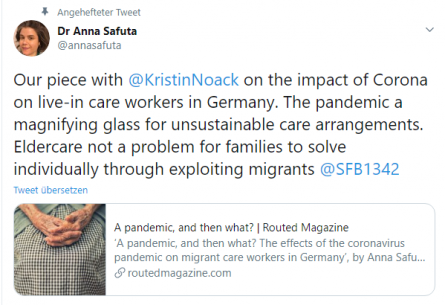Covid-19 and live-in care workers
German households are employing up to 500,000 migrant care workers, most of them Polish, to a lesser extent Romanian, Bulgarian and Ukrainenian. "Their employment conditions are often at odds with legal requirements concerning minimum wages and working time", Safuta and Noack write in their article. But they and their families heavily rely on the income, often generated as "live-in workers" who are staying with the families in Germany for several weeks or month before returning h to their home countries for a given period of time.
These often precarious working conditions got aggravated during the Covid-19 pandemic and by the measures of the German government and administration, e.g. travel bans, border controls, two-week quarantine obligations.
For their article Safuta and Noack also analysed discussions among migrant care workers in social media. They found, that "[t]he pandemic created tensions between carers who wanted to keep working and those who accused them of putting themselves and others unnecessarily at risk or accepting the unacceptable."
Read the full article "A pandemic, and then what? The effects of the coronavirus pandemic on migrant care workers in Germany" at Routed Magazine.

Kontakt:
Kristin Noack













